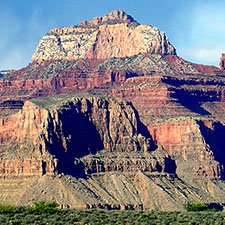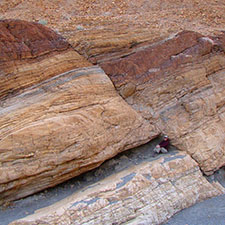EAPS faculty and students in tectonics study how the Earth has evolved over billions of years, integrating observations from the building and breaking of mountain ranges to the rise and filling of ocean basins, with an eye to their impact on the evolution of life.

Tectonics

Geophysics
Our geophysics faculty and students quantify the forces that currently shape the surface of our planet, from plate tectonics to mountain building, and the strength of the crust and mantle, from cold rocks that break as earthquakes to warm rocks that flow.

Geomorphology
Select EAPS faculty and students focus their research on the study of the origin and evolution of landscapes created by physical and chemical processes including tectonics, the flow of water and ice, and climate change.

Energy
Research in the traditional and unconventional energy thematic areas are conducted by our faculty and students, including the study of the exploration of reservoirs, the sedimentological and structural characterization of wells, and fluid/rock interactions.
Geology and Geophysics News
As Earth slowed its spin, oceans may have tipped the balance for life
02-16-2026
Earth has not always rotated at the same speed it does today. Over the roughly 4 billion years that life has existed on the planet, Earth's rotation has gradually slowed, lengthening days and quietly reshaping the oceans. New research from Purdue University suggests that this planetary slowdown may have played an important role in making Earth's oceans more hospitable for life
Rocks and rolls: The computational infrastructure of earthquakes and physics of planetary science
01-14-2026
An expert in earth sciences and seismology, Andrea Donnellan, professor and head of the Department of Earth, Atmospheric, and Planetary Sciences, gets much of her data from a bird’s-eye view, studying the planet’s surface from the air and space, using the data to make discoveries and deepen understanding about earthquakes and other geological processes.
Ancient Desert Clues Reveal Rhythmic Climate Shifts in Early Pleistocene Death Valley
12-16-2025
A new paleoclimate study from Purdue University has uncovered evidence that yearly precipitation in southern Death Valley once swung between extreme drought and significantly wetter than modern conditions over cycles lasting tens of thousands of years.
The evolutionary history of kissing, moss in space, and the origins of the moon
12-11-2025
NPR Short Wave Podcast— Now, a new paper in the journal Science is attempting to figure out what this object Theia was made out of and where in the solar system it came from. EAPS's Kelsey Prissel made an appearance on the podcast.
NASA rover spots something on Mars that doesn't belong there
11-17-2025
Mashable — NASA's Perseverance rover has identified an exotic rock on Mars that may be an iron-nickel meteorite, according to scientists on the mission team. EAPS's Candice Bedford was quoted in the article.
